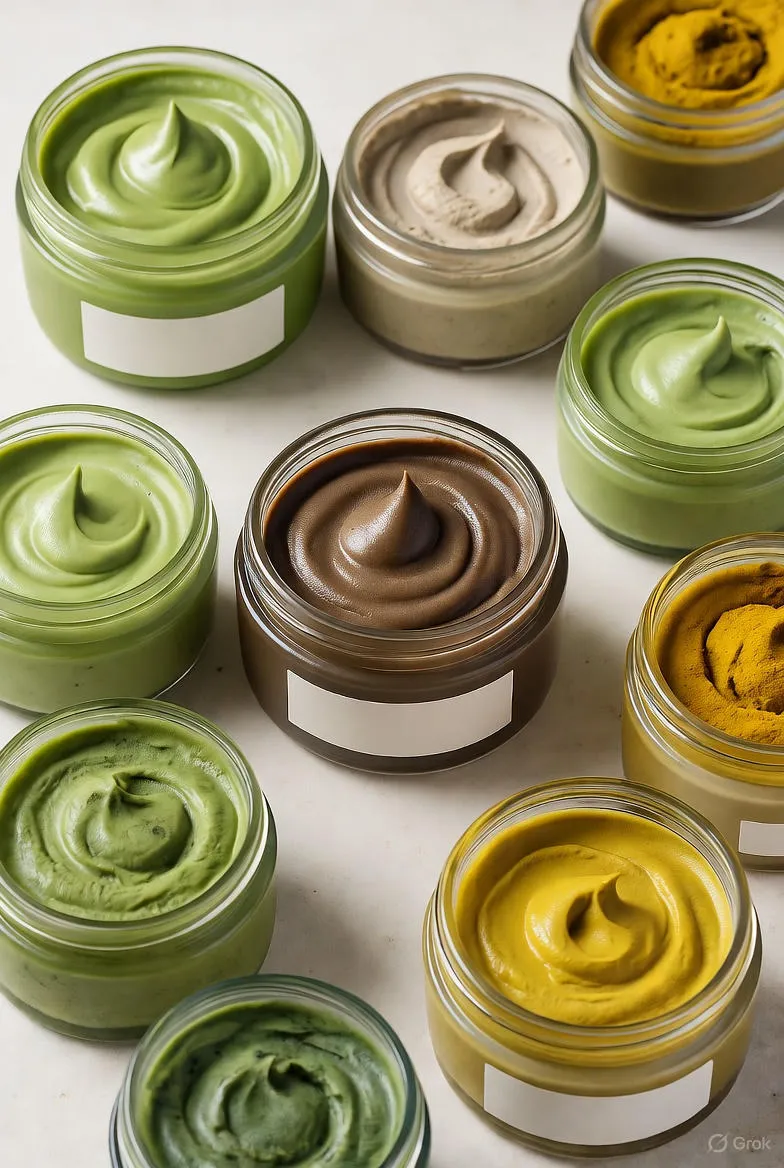Discover the Best Organic Face Masks from Natural Sources for Radiant Skin
Explore organic face masks from natural sources like fruits, herbs, and clays. Discover DIY recipes, benefits, and tips for glowing, healthy skin without chemicals.

Introduction to Organic Face Masks
In today's fast-paced world, where skin is constantly exposed to pollution, stress, and harsh chemicals, turning to organic face masks made from natural sources offers a refreshing and effective way to nurture your complexion. These masks harness the power of ingredients straight from nature—think fresh fruits, herbs, clays, and oils—that have been used for centuries in beauty rituals across cultures. Unlike commercial products loaded with synthetic additives, organic face masks provide gentle, nourishing care that aligns with your body's natural rhythms, promoting healthier, glowing skin without compromising on sustainability.
What makes organic face masks so appealing? They are free from parabens, sulfates, and artificial fragrances, reducing the risk of irritation and long-term damage. Sourced from the earth, these ingredients are often locally grown or wild-harvested, supporting eco-friendly practices. Whether you're battling dryness, acne, or signs of aging, there's a natural mask recipe tailored to your needs. In this guide, we'll explore the benefits, key ingredients, DIY recipes, and tips for incorporating them into your routine.
The Benefits of Using Organic Face Masks
Organic face masks deliver a multitude of benefits that go beyond surface-level glow. First and foremost, they deeply cleanse pores by drawing out impurities without stripping the skin's natural oils. Ingredients like bentonite clay or oatmeal act as gentle exfoliants, sloughing off dead cells to reveal smoother texture. For hydration, masks infused with aloe vera or honey lock in moisture, combating flakiness and fine lines.
One standout advantage is their anti-inflammatory properties. Chamomile, green tea, and turmeric—common in natural masks—calm redness and soothe conditions like eczema or rosacea. Antioxidants from berries and citrus fruits fight free radicals, slowing the aging process and protecting against environmental stressors. Studies from dermatological journals highlight how these natural compounds enhance collagen production, leading to firmer, more elastic skin over time.
Moreover, using organic masks supports holistic wellness. The ritual of applying a mask encourages mindfulness, turning skincare into a moment of self-care. Environmentally, choosing natural sources reduces your carbon footprint, as these ingredients require fewer resources to produce and package. Users often report improved skin barrier function after consistent use, with fewer breakouts and a more even tone. If you're new to this, start with a patch test to ensure compatibility, but rest assured, nature's pharmacy is forgiving and forgiving.
Key Natural Ingredients for Organic Face Masks
The beauty of organic face masks lies in their simple, potent ingredients. Let's dive into some stars of the natural world.
Fruits and Berries
Strawberries, with their high vitamin C content, brighten dull skin and fade dark spots. Blend them into a mask with yogurt for a lactic acid boost that gently exfoliates. Blueberries, packed with anthocyanins, offer powerful antioxidant protection, ideal for mature skin. Bananas provide potassium and natural oils to hydrate and soften, making them perfect for dry types.
Herbs and Flowers
Calendula petals soothe sensitive skin, promoting healing for minor irritations. Mint leaves invigorate and clarify oily complexions, while lavender relaxes and balances. These herbs can be infused into bases like honey or infused oils for added therapeutic effects.
Clays and Earth Elements
Bentonite and kaolin clays absorb excess oil and detoxify, drawing out toxins like a magnet. French green clay, rich in minerals, is excellent for acne-prone skin, reducing inflammation without over-drying.
Oils and Butters
Coconut oil and shea butter form emollient bases, sealing in hydration. Tea tree oil adds antimicrobial punch for blemish control, but use sparingly to avoid sensitivity.
Combining these creates synergistic effects; for instance, pairing clay with fruit juices enhances absorption while infusing nutrients.
DIY Recipes for Organic Face Masks
Creating your own organic face masks is empowering and cost-effective. Here are five easy recipes using pantry staples. Each serves one and takes under 10 minutes to prepare. Apply to clean skin, leave on for 10-15 minutes, then rinse with lukewarm water. Follow with a natural moisturizer.
1. Hydrating Avocado and Honey Mask
- Ingredients: 1/2 ripe avocado, 1 tbsp raw honey, 1 tsp olive oil.
- Method: Mash the avocado until creamy, stir in honey and oil. This mask deeply moisturizes, thanks to avocado's healthy fats and honey's humectant properties. Ideal for winter-dry skin.
Avocado's vitamins A, D, and E nourish while olive oil strengthens the barrier. Expect softer, plumper skin post-rinse.
2. Brightening Turmeric and Yogurt Mask
- Ingredients: 1 tbsp plain yogurt, 1/2 tsp turmeric powder, 1 tsp lemon juice.
- Method: Mix until smooth. Turmeric's curcumin fights inflammation and evens tone, yogurt exfoliates mildly, and lemon adds vitamin C for glow. Caution: Turmeric stains, so rinse thoroughly.
This golden blend is a staple in Ayurvedic traditions, proven to reduce hyperpigmentation over weeks of use.
3. Detoxifying Green Tea and Clay Mask
- Ingredients: 1 tbsp bentonite clay, 1 tsp matcha green tea powder, brewed green tea to form paste.
- Method: Combine and apply. The clay purifies, while green tea's catechins calm and protect. Great for oily or combination skin.
Regular use can minimize pore size and control sebum production, leading to a matte, refined finish.
4. Soothing Oatmeal and Aloe Vera Mask
- Ingredients: 2 tbsp ground oats, 2 tbsp fresh aloe vera gel, a few drops of lavender essential oil (optional).
- Method: Blend into a paste. Oats absorb oil and soothe itchiness, aloe hydrates and heals. Perfect for sensitive or sun-exposed skin.
This mask draws from ancient Egyptian recipes, offering instant relief from redness.
5. Exfoliating Papaya and Pineapple Mask
- Ingredients: 1/4 cup mashed papaya, 2 tbsp pineapple juice, 1 tsp honey.
- Method: Mix well. Enzymes like papain and bromelain dissolve dead skin, revealing freshness. Use weekly to avoid over-exfoliation.
Tropical fruits like these provide a spa-like treatment at home, boosting circulation for a natural blush.
How to Choose and Store Natural Ingredients
Sourcing quality matters for efficacy. Opt for organic produce from farmers' markets or certified suppliers to avoid pesticides. Fresh is best—herbs wilt quickly, so harvest or buy small batches. For clays and powders, check for pure, unadulterated forms without fillers.
Storage tips: Keep fruits in the fridge for up to a week; dry ingredients in airtight jars away from light. Pre-made masks last 2-3 days refrigerated. Label with dates to track freshness. If using essential oils, store in dark glass to preserve potency.
Customization is key—adjust ratios based on skin type. Oily? Add more clay. Dry? Amp up oils. Always consult a dermatologist for severe issues.
Incorporating Organic Masks into Your Skincare Routine
For optimal results, use masks 2-3 times weekly. Evening sessions allow overnight recovery. Layer after cleansing, before serums. Pair with a gentle routine: natural cleanser, toner from witch hazel, and oil-based moisturizer.
Track progress with a journal—noting texture, tone changes. Combine with lifestyle tweaks like hydration and sleep for amplified effects. Over time, you'll notice resilience against stressors, fewer reactions to products.
In diverse climates, adapt recipes—cooling cucumber for summer, warming cinnamon for winter (sparingly). Global traditions enrich options: Korean rice water for luminosity, Indian besan for oil control.
Potential Drawbacks and Precautions
While natural, allergies exist—citrus can irritate, nuts trigger reactions. Patch test on inner arm 24 hours prior. Fresh ingredients spoil, so discard unused portions. Avoid eyes and open wounds.
Pregnant? Skip essential oils. Children? Simplify recipes. Nature's potency varies by season and soil, so results differ. Patience yields the best outcomes.
Conclusion: Embrace Nature's Glow
Organic face masks from natural sources aren't just treatments; they're celebrations of earth's bounty. By embracing these rituals, you invest in skin health, sustainability, and serenity. Experiment, enjoy, and let your radiance shine through. Your skin—and the planet—will thank you.


